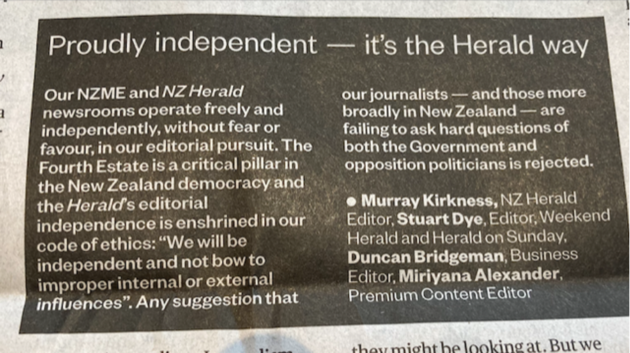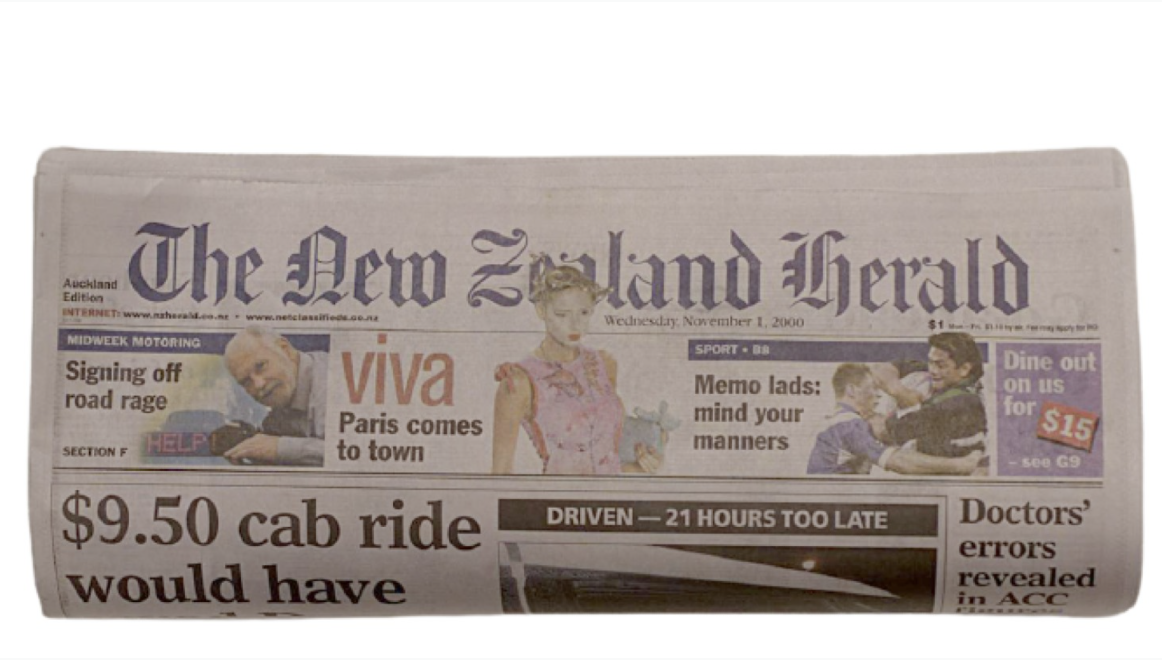Cards on the table at the outset: last Saturday morning, this in the Weekend Herald gave me a gutsful.

It led to me emailing colleagues in an email chat group, saying:
Murray Kirkness is a bloody hypocrite with his mendacious “Proudly Independent” claptrap on Herald on-line republishing rot from The Spinoff by Toby Manhire bagging Judith Collins.
I then made and had acknowledged, a complaint to the Media Council against the Herald, summarising my complaint thus:
This scurrilous opinionated attack on the Leader of the Opposition, Hon Judith Collins, by an employee of another so-called news source, The Spinoff ‘s Toby Manhire appeared on-line at 10 a.m. the same day as in the print edition of the Weekend Herald, the editor Murray Kirkness claimed that his newspaper was “proudly independent”. If such mendacity is not stopped by the Media Council, that body will lose whatever credibility it may still retain.
Manhire’s republished rant was about New Zealand needing a serious Opposition leader.
As if it wasn’t enough for Herald Press Gallery staffer Claire Trevett to wage an unceasing bagging of Judith Collins in her (Trevett’s) apparent campaign to foment discord in the National Party caucus which Judith is working to unite, ‘Granny’ Herald republishes garbage from The Spinoff, an outfit so far left that it falls off the page.
Then the Herald has the gall to proclaim itself “Proudly Independent”. Huh? Not so independent as to not accept $400,000 from Jacinda’s bribery fund of $55 million, titled quaintly: The Public Interest Journalism Fund (aka Jacinda’s Bootlicker’s Goodies Chest, available only to media who publish her falsehoods such as Te Tiriti being a “partnership”).
But to be fair to the Herald, they do make efforts, token maybe, but efforts nonetheless. Such as publishing the views of former Labour Minister Richard Prebble, who has emerged as one bastion of common sense (though they refuse to publish distinguished historian Dr Michael Bassett, a fellow-minister of Prebble’s in the Lange Labour government of the 1980s); as well as the response of ACT leader David Seymour to criticism of his take on Dr Siouxsie Wiles. I have to wonder, though, whether giving prominence to Seymour is intended by the Herald to divert attention from Judith Collins as official Leader of the Opposition).
Also on Saturday, the Weekend Herald published a must-read article by Bruce Cotterill, once CEO of a media company.
Bruce ended his article by saying:
In a democracy it is very important that a government and indeed members across the political spectrum are able to get their messages out to the people in a way that provides a fair representation of their policies and their activities.
However, it is also equally important that the media question those policies and activities in a way that seeks greater clarity about what those policies are meant to achieve, and greater accountability in regard to their execution and effectiveness. As Thomas Jefferson, the third President of the United States, once said: “No government ought to be without censors; and where the press is free no one ever will.”
Earlier in his article, Bruce says:
The media must be free. Free to ask, question, challenge and investigate. Free to publish its findings. Free to hold governments to account.
He is suggesting that holding governments to account is a major responsibility of news media. I beg to differ: the major responsibility of media is to tell us what is happening in our world, fully, accurately and fairly reflecting all the various shades of opinion. “Holding government to account” is the responsibility of the public who elect governments, and who also elect Oppositions to hold governments to account on our behalf.
Back in 1948 at age 20, when I decided I wanted to be a sports reporter, I started a journalism course at Auckland University conducted by the then Chief Reporter of the Herald, Noel Chappell, a thorough professional. I have never forgotten two points he made in our first lesson:
- The importance of news: Someone rescued from being stranded on a desert island, after having been fed and watered, and tattered clothing replaced, will then ask: “What’s been happening in the world”.
- The famous principle enunciated by the legendary editor of the Guardian, C P Scott: “Comment is free; facts are sacred.” The principle was first set down by Scott in his famous centenary essay, which should be compulsory annual reading for every journalist.
I began my reporting career in Pahiatua soon after, and within a year by a strange set of circumstances become editor. Subsequent changes in career and places of residence (Auckland, Samoa, Wellington, Napier, then back to Auckland in 1971), saw me end up where I really belonged – our wonderful wine industry. But I never lost my love of writing, hence my presence on The BFD.
Through all of this, there is a profound sadness about the continuing desecration of the New Zealand Herald since those marvellously dedicated ink-imbued families, Wilson & Horton lost control. Irishman Tony O’Reilly did neither New Zealand nor the paper any favours during his ownership, and, today, what was once acknowledged as by far our country’s best newspaper is the plaything of a variety of financial interests as this list of its top 20 shareholders shows.
One name stands out: Accident Compensation Corporation (ACC). This prompts a question: ACC is a publicly-owned Government operated agency. There are left-wing dreamers who demand that government agencies divest themselves of investment in products like fossil fuels or services that cause “emissions”. Surely, these same demented souls would see it as a conflict of interest for ACC to invest in an enterprise that takes bribes from the government? When will they protest?
Meantime, the rest of us should use whatever links we have with those commercially engaged shareholders to demand that they ensure that their print medium, the NZ Herald, should stop boot-licking this Marxist Puapuan Prime Minister.
Tail-Piece: Maori Language Week
Kia koutou katoa! Nga mihi nui ki nga whanau o te BFD!
A new English word has appeared these last few days reofication a synonym for what others had previously been calling “Maorification”, such as Paremata for Parliament, Tamakimakaurau for Auckand, and so on. I think reofication is more appropriate because it refers to text rather than to people, among whom I have a number of good mates.
The determined stealth of the Ardern gang to infiltrate He Puapua will surely expand reofication if we don’t take steps to curb it. For instance, with Kris Faafoi seemingly back from AWOL on immigration, we can expect him to get back to pushing his plot to reconnect TVNZ and RNZ into a single broadcasting entity. And no doubt to saddle it with a Maori name, with all the irrelevance it has devoted to our land transport agency NZTA by calling it Waka Kotahi (First Canoe). Seeing as broadcasting output reaches our homes largely by aerial antennae, don’t be surprised if its reo version becomes KO TANGA.
Ka kite till next wiki!
Please share this BFD article so others can discover The BFD.

